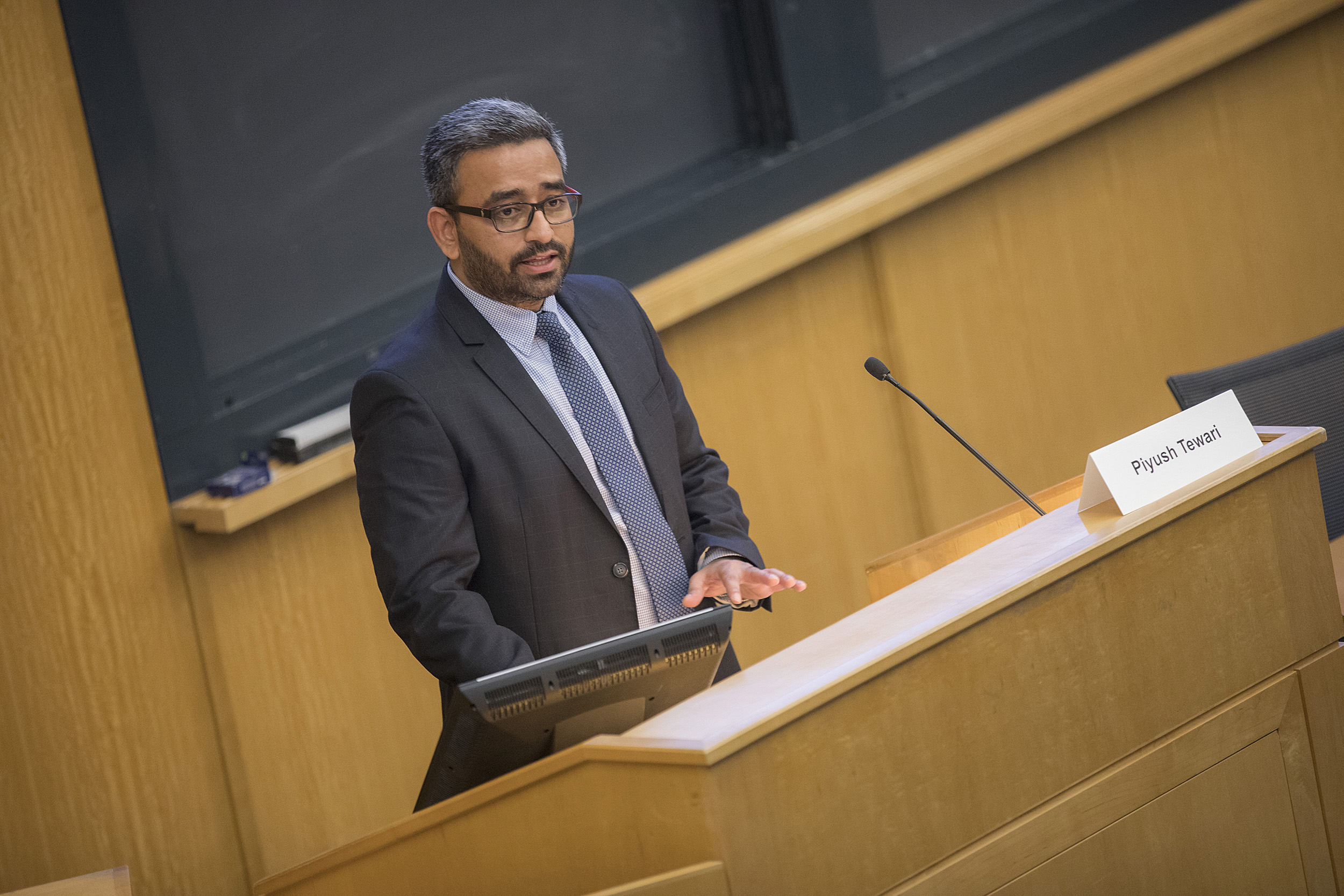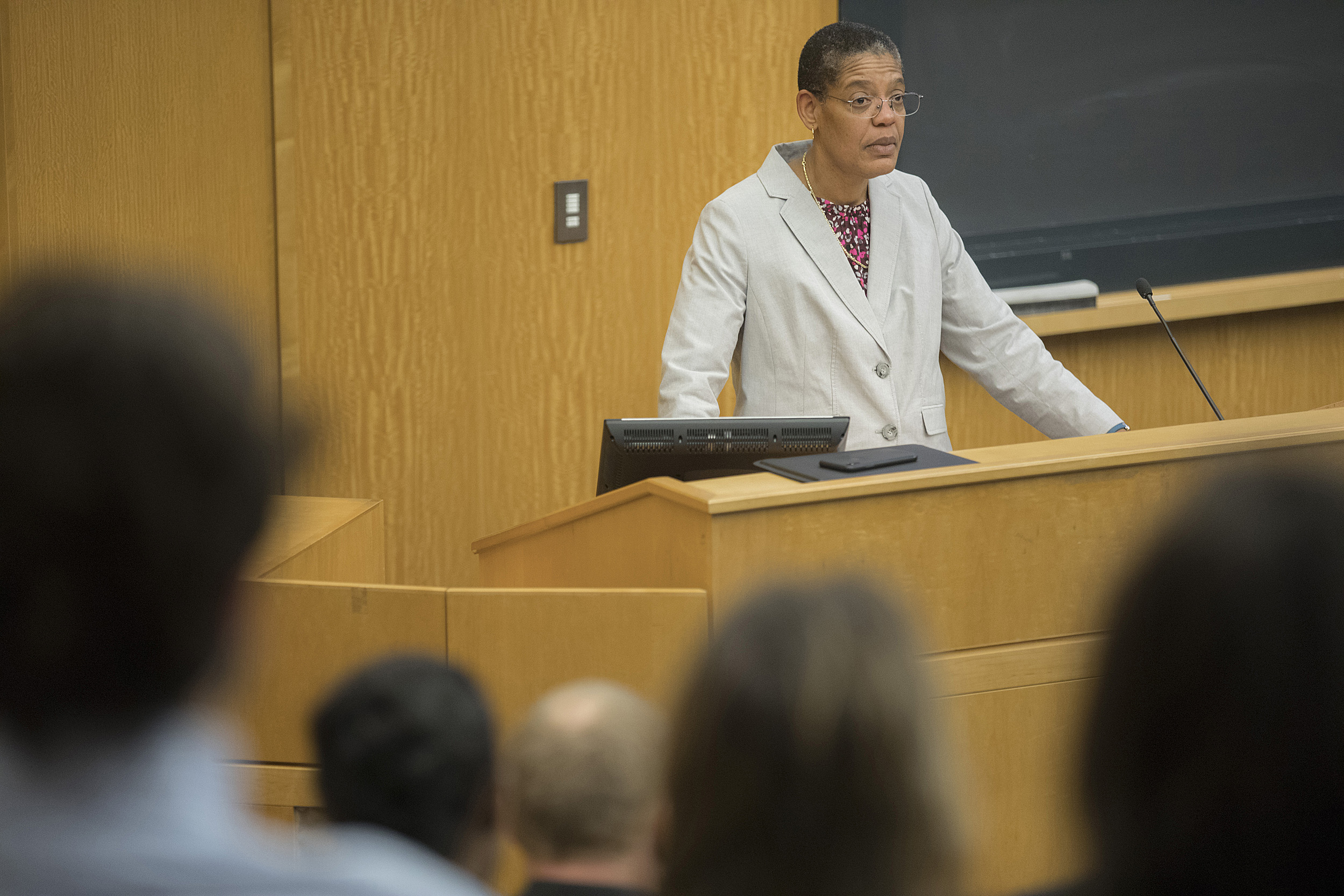
Keynote speaker Piyush Tewari speaks about his cousin’s death in a hit-and-run that prompted him to create the SaveLIFE Foundation during a half-day symposium on traffic safety around the globe.
Kris Snibbe/Harvard Staff Photographer
Reducing a global killer: Traffic accidents
Harvard symposium examines ways to tackle road conditions and mistakes that took 1.25 million lives in 2013
When Piyush Tewari heard that his 16-year-old cousin had been struck and killed by a car while walking home from school in India, he wanted to understand better what had happened, so he went to the scene.
What he found was so disturbing that it prompted him to create an India-based nonprofit and dedicate his life to fighting what has become a worldwide epidemic of road-related injuries and deaths.
This week, the Harvard Global Health Institute joined the fight against road tragedies, partnering with Tewari’s nonprofit, the SaveLIFE Foundation, in an effort to combat global traffic deaths, which took 1.25 million lives in 2013. Such accidents are the leading cause of death for young people age 15‒29.
According to accounts that Tewari gathered, his cousin had been walking home on a clear afternoon and had looked for oncoming traffic before he started across the street. He was hit after he crossed the center line by a speeding driver who’d pulled onto the wrong side of the road to pass other cars. Worse, the driver panicked after the accident, and in his haste to get away ran over Tewari’s cousin a second time.
As badly injured as the boy was at the time, he might have survived if emergency response had been prompt, but bystanders neither tried to help him nor called police. After 45 minutes, the boy died of blood loss.
Instead of just condemning the passersby, Tewari traveled around the country, talking to police, lawyers, victims, and their families. He heard that police investigation of traffic accidents was often pro forma, with blame assigned routinely to the larger vehicle. In addition, he found that bystanders who render assistance may become immersed in the investigations and subsequent legal actions, which can drag on for years. It’s also not unheard of for them to be treated as suspects and blamed.
That realization prompted Tewari, a 2017 Harvard Kennedy School graduate, to spearhead efforts to pass a “Good Samaritan” law, shielding those who offer assistance to people injured in traffic accidents. The now two-year-old law was just a first step, and the organization has embarked on a program to study and analyze traffic accidents on India’s most notorious stretch of highway, the 60 miles between Mumbai and Pune.
Tewari told his story as a keynote speaker at Harvard’s Tsai Auditorium on Monday. The “Road Safety for All: Innovations in Road Traffic Injury Prevention and Response” symposium featured speakers on a host of issues, from ways to make roads safer to the promise and problems of self-driving cars to how to improve emergency response to accidents.
The symposium, sponsored by the Harvard Global Health Institute, the Lakshmi Mittal South Asian Institute, and the SaveLIFE Foundation, opened with comments from Harvard T.H. Chan School of Public Health Dean Michelle Williams.

“It’s hard to imagine a public health challenge of greater magnitude and geographical range than that of road traffic injuries,” said Dean Michelle Williams in opening remarks. “The toll of road traffic injuries is staggering.”
Kris Snibbe/Harvard Staff Photographer
Williams said it is tempting to view traffic deaths as a “cost of doing business” for the fast, convenient transportation vehicles offer. But the promising results gained by seat-belt laws, the designated-driver campaign (pioneered at the Harvard T.H. Chan School’s Center for Health Communication) and Sweden’s Vision Zero program, which has halved the rate of traffic fatalities and is being replicated in other countries, show that road-related deaths and injuries often don’t have to happen and shouldn’t be accepted.
Traffic accidents cost society greatly, Williams said. More people die from crashes than from either AIDS or malaria. In 2015, traffic fatalities were the 10th leading cause of death worldwide and the leading cause among 15- to 29-year-olds. Without new steps to reduce it, projections are that by 2030 it could be the seventh-leading cause of death worldwide, Williams said.
Accidents impose an economic toll as well, Williams said, costing most countries as much as 3 percent of their gross domestic product. And, as with many global health disparities, the burden falls disproportionately outside of the industrialized world, with 90 percent of fatalities occurring in low- and middle-income countries, even though they have just half the world’s vehicles.
“It’s hard to imagine a public health challenge of greater magnitude and geographical range than that of road traffic injuries,” Williams said. “The toll of road traffic injuries is staggering.”
Speakers at the event highlighted several steps countries can take to make their roads safer. Helmet laws would make a big difference in places where motorcycles are widely used as a family’s only transportation. Lower speed limits, seat-belt laws, and tough restrictions against drunk driving are also effective, as are improved emergency care and reduced response times, as well as engineering solutions that make vehicles and roadways safer.
For example, Tewari spoke of removing a poorly designed bridge pillar and concrete roadside flower pots on the Mumbai to Pune highway that had been involved in past crashes. Overall, Tewari said, their investigation of the roadway revealed 2,150 engineering errors. His foundation fixed 922 of them last year, he said, and in 2017 fatalities on the road dropped 30 percent, while those involving infrastructure fell 78 percent.
Overall, the speakers advocated an evidence-based approach, where analysis of the causes of traffic accidents in various locations can lead to effective solutions.
“This problem of road traffic injuries is massive. It feels complicated because it is complicated,” said Harvard Global Health Institute Director Ashish Jha, the K.T. Li Professor of Global Health. “We can take bits of it and pieces of it … and make progress on it in ways that dramatically reduce the suffering that it causes. This [event] is our commitment at the institute to beginning that journey and going down that path.”







